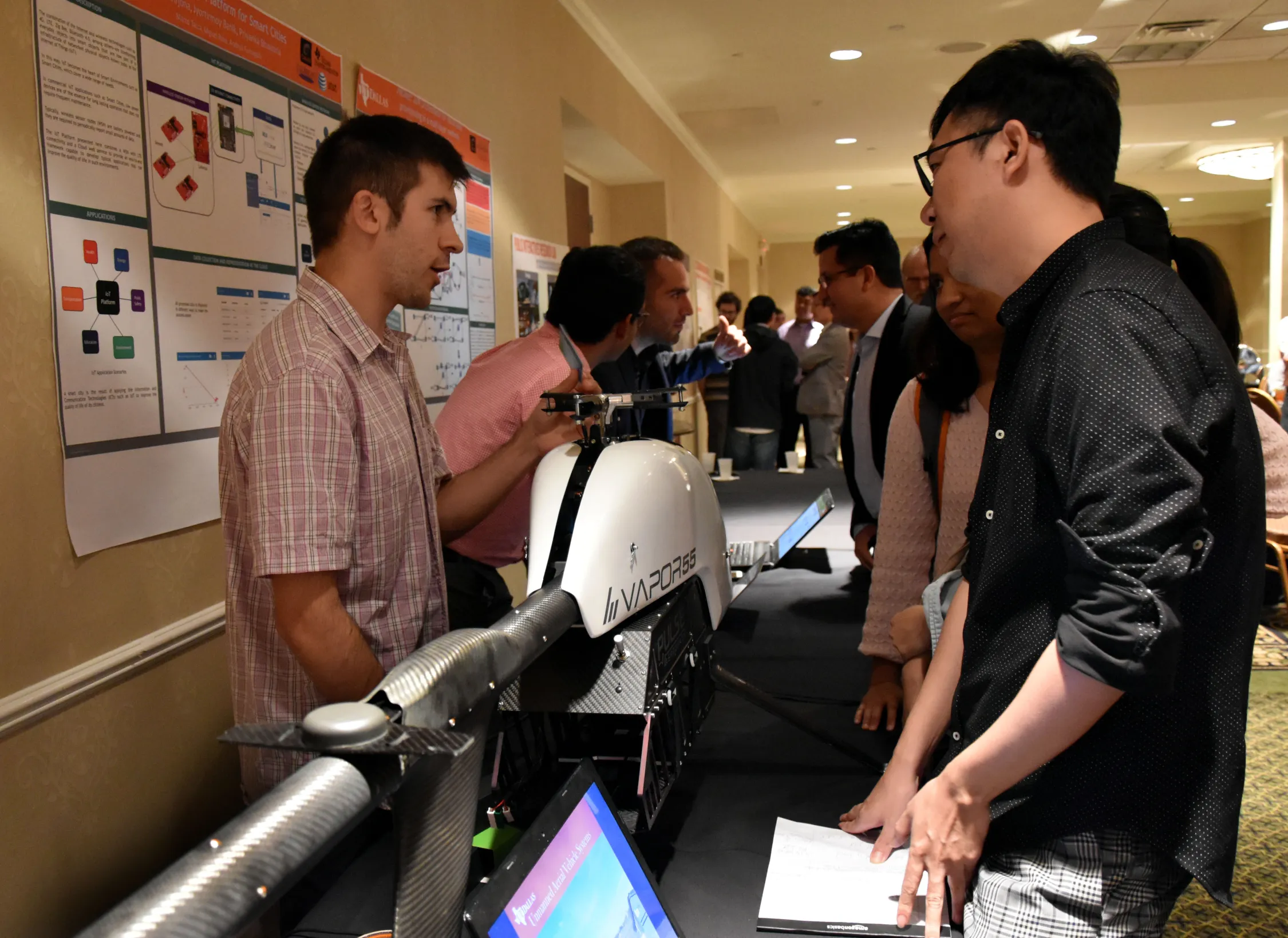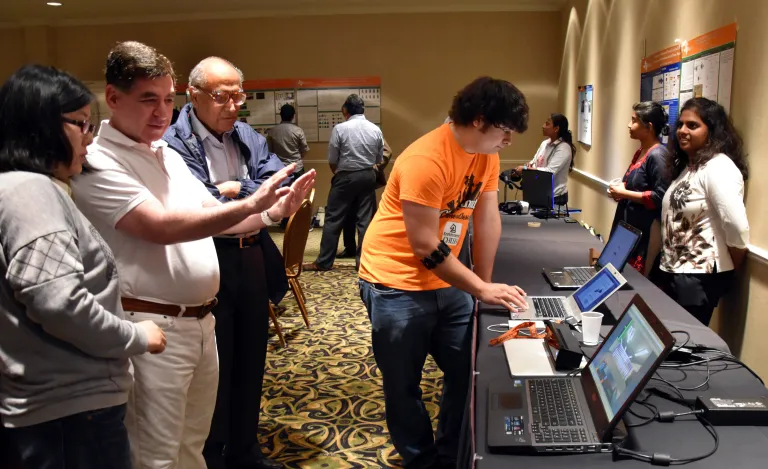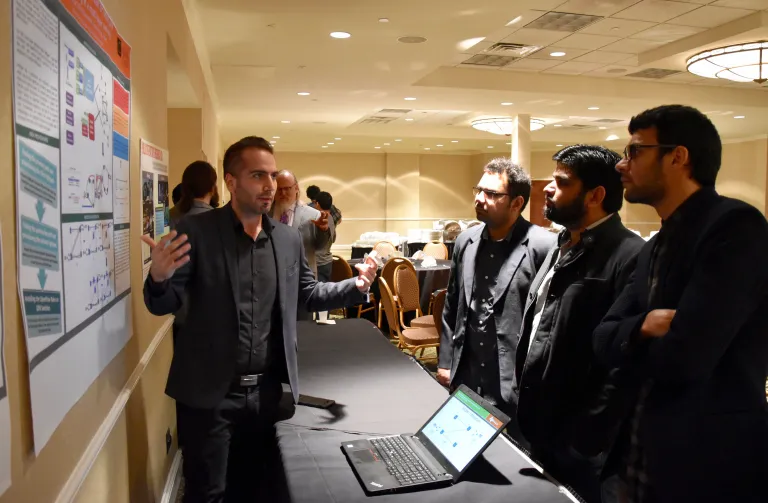International Researchers and Industry Specialists Explore Latest Research in Interactive and Spatial Computing

Last April, the UT Dallas Institute of Interactive and Spatial Computing (UT-DIISC) held its second International Workshop on Interactive and Spatial Computing (IWISC). IWISC is an international workshop that provides a forum for international researchers and practitioners from academia, industry, and government to present and discuss state-of-the-art research and concepts within the field of interactive and spatial computing. The two-day workshop was held in Dallas, Texas, on Thursday, April 13th and Friday the 14th. The workshop was sponsored by the UT Dallas Computer Science Department.
The workshop attracted attendees from various universities and research institutes including University of Guanajuato, Mexico, Mountain View College, Mayo Clinic, Samsung Research, University of Missouri-Columbia, University of Texas Southwestern Medical Center (UTSW), Texas A&M University, as well as the UT Dallas Computer Science, Electrical Engineering, ATEC (Arts, Technology, and Emerging Communication) departments, and the UT Dallas School of Economic, Political, and Policy Sciences (EPPS)/Geospatial Information Sciences (GIS).
The goal of the UT Dallas Institute for Interactive and Spatial Computing (UT-DIISC) is to incorporate activities in a broad spectrum of disciplines such as computational geometry, computer graphics, high-dimensional data analysis, human-computer interaction, information visualization, multimedia, and virtual reality. These activities enhance knowledge and human performance through bioinformatics, physically-based modeling and simulation, and training and education applications.
The workshop, which was held over a two-day period, consisted of research demonstrations, poster presentations, keynote speakers, workshops, and presentations. The first day of the workshop began with demonstrations, posters, a banquet dinner, and an invited talk by Prof. May Yuan, of UT Dallas School of Economic, Political, and Policy Sciences/ Geospatial Information Sciences. Nearly 17 projects were on display that provided workshop attendees with an interactive platform to explore the latest, ongoing research in the fields of interactive and spatial computing. The poster presentations afforded workshop attendees the opportunity for direct interaction with academics, researchers, and industry personnel.

Dr. May Yuan’s talk titled, “Identify Movement and Interaction Patterns from Large GPS Data of Individual Entities,” focused on findings from the GPS Offender Trajectory Analysis Project, where she and her fellow researchers developed trajectory analysis methods to identify movement patterns of offenders who were on the Oklahoma location-based offender monitoring program. Currently, Dr. Yuan’s research lab is exploring ways to understand movements in 3D local space, such as in a mall, neighborhood, or campus. They have been building a 3D GIS database of UT Dallas campus, including buildings with detailed floor plans. The purpose of the project is to understand how physical structures (indoor and outdoor) may influence human movements and sense of space.

The second day of IWISC 2017 consisted of not only poster presentations, but also demonstration sessions of current research projects, coupled with invited oral presentations of technical papers. The poster presentations provided workshop attendees the opportunity for direct interaction with academics, researchers, and industry personnel. Guests were given the opportunity to attend the 3rd Annual Computer Science Research Expo (CSREX), as well as a Ph.D. Information Session. The invited talks and research presentations covered all areas related to interactive computing and spatial computing, including, but not limited to, computational geometry, computer graphics, high-dimensional data analysis, human-computer interaction, information visualization, Multimedia, and virtual reality.
The following is a list of all the invited talks presented at the IWISC 2017 Workshop.
- “Visual Cloud Computing and Networking: Foundations and Application Case Studies” by Prasad Calyam, University of Missouri-Columbia
- “Computing in Medicine: Applications for Tracking and Enhancing Human Performance” by Gaurav Pradhan, Mayo Clinic
- “Application of Empirical Similarity Method for 3D Technology” by Francis U. Cho, Mountain View College
- “A Framework for Developing Computer Vision Applications using Rough-Set-Based Rules” by Raul E. Sanchez-Yanez, Universidad de Guanajuato
- “Automating the Capture and Visualization of Analytic Provenance” by Eric Ragan, Texas A&M University
- “A Learning Based Deformable Template Matching Method for Automatic Rib Centerline Extraction and Labeling in CT Images” by David Liu, Samsung Research
Dr. Balakrishnan Prabhakaran, Director of UT-DIISC, said that IWISC was a great success. “Our objective is to make IWISC an annual forum where cutting-edge research in interactive and spatial computing is presented and discussed, that fosters collaboration between researchers working in these areas to solve important problems of today,” he added.
UT-DIISC was established at UT Dallas in Fall 2015 with members from academia, industry, and international research institutions. The founding members include UT Dallas Computer Science faculty members, Drs. Balakrishnan Prabhakaran (Director of UT-DIISC), Sergey Bereg(Associate Director), Ovidiu Daescu, Ryan McMahan, Haim Schweitzer, Xiaohu Guo, Kang Zhang, and Benjamin Raichel.
Click here to visit the UT-DIISC Homepage.
Click here to view all the photos from the 2-day Second International Workshop on Interactive and Spatial Computing (IWISC).
ABOUT THE UT DALLAS COMPUTER SCIENCE DEPARTMENT
The UT Dallas Computer Science program is one of the largest Computer Science departments in the United States with over 2,100 bachelor’s-degree students, more than 1,000 MS master’s students, 150 PhD students, and 86 faculty members, as of Fall 2016. With The University of Texas at Dallas’ unique history of starting as a graduate institution first, the CS Department is built on a legacy of valuing innovative research and providing advanced training for software engineers and computer scientists.




